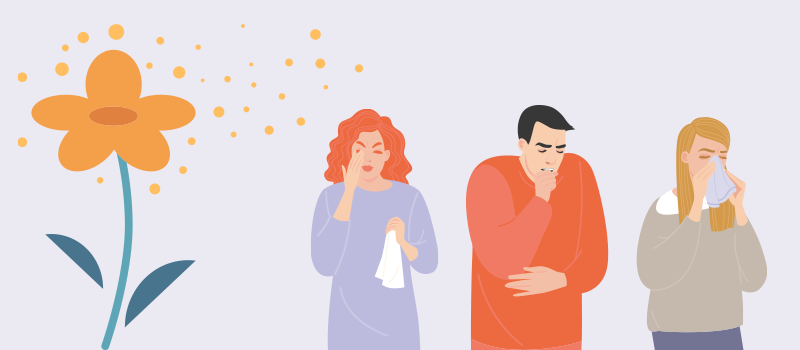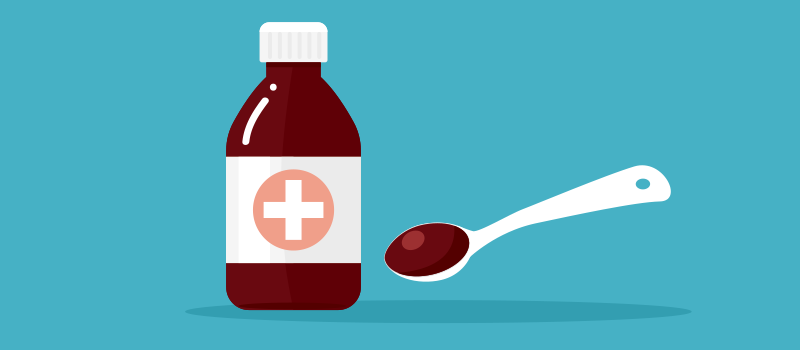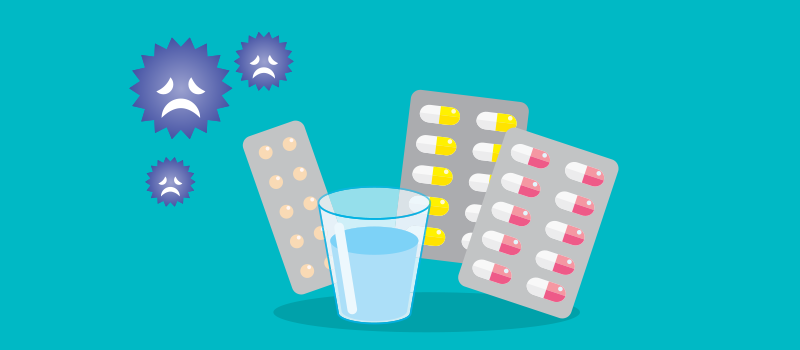What’s the Buzz
The Bee Healthy Blog
Sudafed Dosage, Uses, and Side Effects

Sudafed is a brand-name medicine that contains the active ingredient pseudoephedrine. It is very effective in relieving nasal and sinus congestion. You don’t need a prescription to purchase this medicine; however, Sudafed products are kept behind the counter. To make a purchase, you must be at least 18 years old with a valid form of photo ID. Keeping Sudafed products behind the counter, along with other regulations, was mandated by the FDA in 2006 because pseudoephedrine, the main ingredient in Sudafed products, can be used illegally to make methamphetamine. Please continue reading to learn more about Sudafed doses, uses, and side effects.
Is Sudafed an antihistamine?
No, Sudafed is not an antihistamine. It is a nasal decongestant.
Sudafed Uses
The active ingredient in Sudafed Congestion and other Sudafed products is pseudoephedrine HCl. Pseudoephedrine is a sympathomimetic. By binding to the alpha receptors on the vasculature, pseudoephedrine constricts the blood vessels in the nasal passages and reduces swelling of the nasal membranes. This helps to open up the nasal passages and relieves congestion caused by upper respiratory allergies, hay fever, and colds. Sudafed can also help ease sinus pressure and congestion.
Sudafed is a good home treatment option since it provides quick relief from stuffy nose and sinus pressure, but you should watch out for signs of fever or persistent, worsening symptoms. Call your doctor if you are not feeling better after a week.
Is Sudafed good for a runny nose?
Sudafed (pseudoephedrine) is a nasal decongestant. It is used to treat nasal stuffiness. However, other products can help with a runny nose, such as Sudafed PE Sinus Congestion Day + Night which contains a combination of nasal decongestant (phenylephrine hydrochloride) and antihistamine (diphenhydramine hydrochloride). Your doctor or pharmacist can tell you which product is best for your symptoms.
Sudafed Dose
Follow the directions on the product label or your doctor’s instructions carefully. Ask your doctor or pharmacist to explain if you do not understand how much Sudafed you should take. Take Sudafed exactly as directed. Do not take more or less of this medicine or take it more or less frequently than indicated on your prescription or the package label.
Sudafed Dosage Forms
Sudafed oral tablets are available in the form of regular tablets, 12-hour long-acting or extended-release tablets, 24-hour extended-release tablets, and an oral suspension (liquid).
If you take extended-release (long-acting) tablets, make sure you swallow them whole. Do not crush, chew, or break them.
If you are taking Sudafed liquid, use a dose-measuring device such as an oral syringe medicine cup or special dose-measuring spoon to measure the dose. Do not use a household spoon for measuring medication.
Sudafed Doses for Nasal and Sinus Congestion
Sudafed Congestion (Pseudoephedrine 30 mg)
- Adults and children 12 years and older: Take 2 tablets every 4-6 hours. Do not take more than 8 tablets in a 24-hour period.
- Children 6-11 years old: Take one tablet every 4-6 hours. Do not take more than 4 tablets in a 24-hour period.
- Do not give this medication to children younger than 6 years old.
Sudafed 12 Hour (Pseudoephedrine extended-release tablets 120 mg)
- Adults and children 12 years and older: Take 1 tablet every 12 hours. Do not take more than 2 tablets every 24 hours.
- Do not give this medication to children younger than 12 years old.
Sudafed 24 Hour (Pseudoephedrine extended-release tablets 240 mg):
- Adults and children 12 years and older: Take 1 tablet every 24 hours. Do not take more than 1 tablet every 24 hours.
- Do not give this medication to children younger than 12 years old.
Precautions While Taking Cough and Cold Medicines
Pseudoephedrine, the active ingredient in Sudafed, is available alone and in many combination medicines. Check the label of the OTC combination cough and cold medicine to see which ingredients it contains. Be careful while using two or more products as they may contain the same ingredients, and taking them together could result in overdose symptoms.
Over-the-counter cough and cold combination medicines can cause serious side effects, including death in young children. Call your local poison control center or seek emergency medical help in case of a Sudafed overdose.
Giving Sudafed to Children with Nasal Congestion
Do not give over-the-counter Sudafed (pseudoephedrine) to children younger than 6 years of age. Do not give extended-release tablets to children younger than 12 years of age. Use the regular tablets and liquid Sudafed with caution in children 6-11 years of age. Read the package label carefully to check the right product and dosage for your child.
Missed Dose
Sudafed is usually taken as needed. If you take this medicine regularly and miss a dose, take it as soon as you remember. However, if it is nearly time for your next dose, skip the missed dose and take the next scheduled dose according to your regular dosing schedule. Do not take extra medicine to make up for a missed dose.
Is Sudafed OK to take daily?
Sudafed is usually taken for 7 days to relieve nasal congestion. Read the package label carefully. Do not take Sudafed for a longer period of time than mentioned on the label. Call your doctor If your nasal congestion symptoms do not improve within 7 days or if you develop a fever.
Sudafed Side Effects
Common side effects of Sudafed include nausea, vomiting, weakness, restlessness, headache, and insomnia (sleeping problems). Tell your doctor if these side effects are severe or persistent.
Other side effects of Sudafed can be serious. Call your doctor for medical advice about side effects or seek emergency medical help if you experience a fast or pounding heartbeat, trouble breathing, chest pain, severe dizziness, nervousness, stomach pain, or trouble sleeping.
Does Sudafed make you sleepy?
Sudafed (pseudoephedrine) does not usually cause drowsiness. In fact, nasal decongestants can lead to trouble sleeping. However, different people may react differently to certain medications. If you take Sudafed for the first time, you should see how your body reacts to this medication before driving or performing activities requiring mental alertness.
Why should you not take Sudafed at night?
You should avoid taking Sudafed at night because it can cause sleep problems. To prevent this side effect, take your last dose of Sudafed several hours before you go to bed. Sudafed 24-hour tablets should be taken in the morning.
Why do I feel worse after taking Sudafed?
Common side effects of nasal decongestants like Sudafed (pseudoephedrine) include insomnia, nervousness, anxiety, and tremor. These side effects can make you feel jittery or anxious after taking Sudafed. Tell your doctor if the side effects are severe or do not go away in a few days.
When should you avoid Sudafed?
An oral decongestant like Sudafed can give you temporary relief from congestion, but it also has side effects like causing high blood pressure and high blood sugar. Oral decongestants can also make certain medical conditions worse, such as urinary conditions, enlarged prostate gland, glaucoma, and heart disease. In addition, decongestants can interfere with the effectiveness of certain drugs, including epilepsy, diabetes, thyroid disorder, and heart and blood pressure medications. If you have any of the above conditions, check with your doctor or pharmacist before taking an oral nasal decongestant like Sudafed.
Sudafed Drug Interactions
Taking Sudafed with certain other drugs can lead to a dangerous drug interaction. Give your doctor or pharmacist a complete list of all your other medications, including prescription and OTC medications, as well as supplements and herbal products. This can help avoid interactions between Sudafed and your other medicines. Be sure to tell your healthcare providers if you take diet pills, caffeine pills, asthma medications, ADHD medications, or medications used to treat high blood pressure. You should not take Sudafed if you are on an MAO inhibitor, such as Marplan, Nardil, or Eldeprylor, or have taken one in the last two weeks.
Note: This medication guide is for general information purposes. Always check with your doctor or pharmacist before taking any medication.
References:












SOCIAL